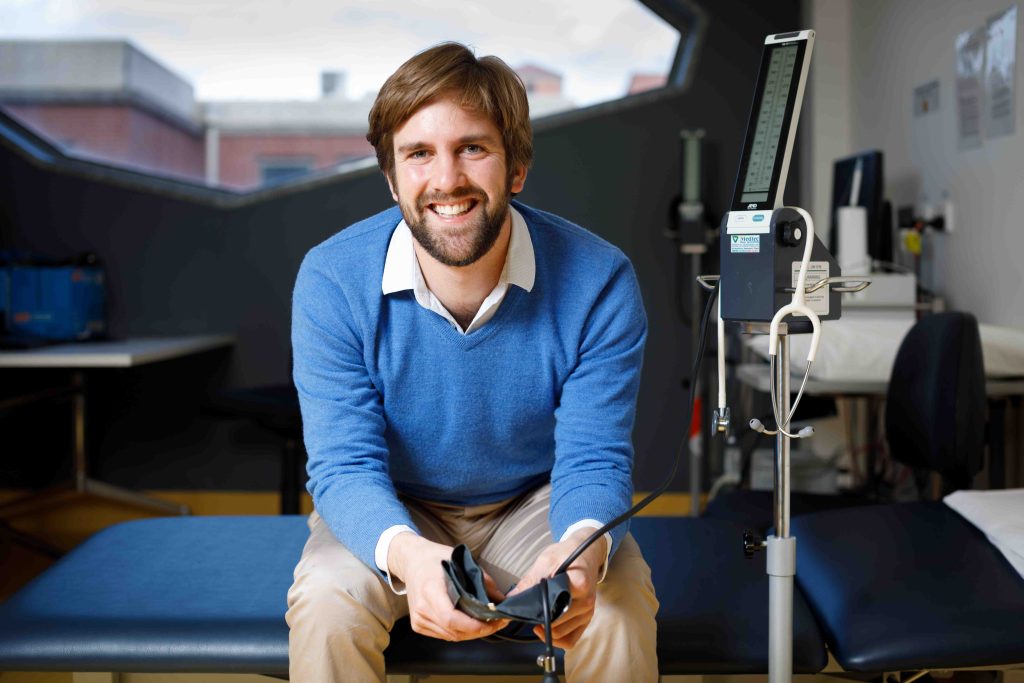Dr Dean Picone will be a familiar name to many of you. That's because the Royal Hobart Hospital Research Foundation has funded several of Dean's studies over the years and we have been privileged to profile his research previously on several occasions, including at various events.
We’re excited about the research he and his team are doing to develop more effective methods of monitoring blood pressure. Why? Because this research is vitally important to all Tasmanians, now and into the future.
Dr Dean Picone is a local Tasmanian researcher within the Menzies Institute’s Blood Pressure Research Group. He has an interest in ensuring blood pressure is measured accurately and has a good reason for this specific research.
While the statistics are startling, fortunately, if high blood pressure is correctly diagnosed and treated, the risk of heart disease and stroke is markedly reduced.
However, to ensure a timely and correct diagnosis can first be made, blood pressure must be measured accurately. This is easier said than done, and that’s where this research comes in.
For more than 10 years, the Blood Pressure Research Group of the Menzies Institute for Medical Research, led by Professor James Sharman, has been working in close collaboration with the Royal Hobart Hospital Cardiology Department.
“We are extremely grateful to the RHH Cardiology Department. The partnership is unique and attracts the envy of other blood pressure researchers from around the world,” said Dr Picone.
“Considerable investments in funding achieved through several bodies, including the Foundation, have generously supported this research program through a range of grants over many years.”
Over this time, the team has generated significant new knowledge related to the accuracy of blood pressure measurement. They have identified that standard blood pressure measurement using an inflatable cuff is actually more inaccurate in people at higher risk of cardiovascular disease – the very people who need an accurate diagnosis.
The team has now identified specific factors that are related to the inaccuracy of blood pressure measurement. This means they are now in a position to begin solving such a longstanding problem. This is great news!
“One of the most critical factors is the shape of the blood pressure ‘waves’ that are transmitted through the body every time the heart beats. The team will analyse this previously unutilised information to begin improving the way blood pressure is measured,” said Dr Picone.
“The aim of the current project is to apply machine learning techniques to the vast quantities of information derived from blood pressure waves and create a more accurate, individualised method of blood pressure measurement,” he said.
To achieve their important research objectives, the team recently collaborated with the Baker Heart and Diabetes Institute’s Computational Biology and Clinical Informatics laboratory. It was this multi-disciplinary partnership that helped lead to the development of an application for the 2021–2023 Foundation's Major Project Grant.
Facing an intense degree of competitive pressure for this $450k grant, the team are excited about what their success in achieving this means to driving their research program further.
The ultimate aim of the research Dr Picone and his team are undertaking is to improve the accuracy of blood pressure measurement, thereby helping reduce preventable cardiovascular diseases in Tasmania, and eventually globally – an aspiration which has the potential to impact millions of lives.
“I would like to thank the Royal Hobart Hospital Research Foundation and its generous supporters for funding this project and all the other important medical research happening in Tasmania,” Dr Picone said.
You can help fund incredible research like Dr Picone's by simply by making an online donation today. Thank you for supporting the health and wellbeing of the Tasmanian community.
